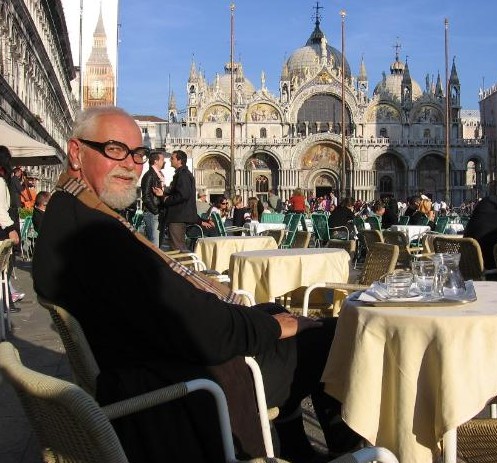In The News: Burned Books, George Washington Baseball Cards, and the Alibris Nickel
- by Michael Stillman

Artist and book burning protestor Charles Merrill, from his website.
By Michael Stillman
Artist Charles Merrill recently announced that he had burned a valuable rare manuscript copy of the Koran. No stranger to controversy, Merrill had previously taken a pair of scissors and black marker to a copy of the Bible to express his displeasure. If nothing else, he believes in treating religions equally.
In a press release, Merrill stated, "The purpose of editing and burning Abrahamic Holy Books is to eliminate homophobic hate. Both ancient books are terrorist manuals." Merrill is an acknowledged homosexual and avowed atheist, which probably didn't make him popular among his North Carolina neighbors. Among his previous means of protest were failing to pay taxes on the ground that the tax code is discriminatory, it failing to offer gay couples the tax benefits of marriage. Of course failing to pay taxes is a universal form of protest. Many people, especially those paid in cash, regularly protest in this manner.
The case is somewhat reminiscent of the Kansas City bookseller who protested the decline in reading by burning books. However, those were books of little to no economic value, being ones he could not sell, nor even give away. Merrill's Koran was valued, according to Merrill, at $60,000. Evidently, he could afford such an expensive protest. He described himself as a "self-made millionaire," but it probably didn't hurt that his cousin was co-founder of brokerage Merrill Lynch, or that his late wife, Evangeline Johnson Merrill, was the only daughter of the founder of pharmaceutical giant Johnson and Johnson. The rare Koran was said to have been given to her in the 1950s by the late King of Jordan.
Speaking of the Kansas City bookseller, Prospero's Books held its second book burning in September. This was reportedly meant to once again protest the decline in reading. There were no $60,000 books in this collection. These were books that could not even be given away. Instead of just quietly tossing the books out, as many sellers do, Prospero's attempted to generate attention to a cause (and perhaps their business) by the use of a dramatic protest, one with undertones of uglier events. Book burnings are generally associated with causes other than promoting literacy. In fact, they are generally associated with the exact opposite. It's like watching a group of protestors goose-stepping in unison in a protest for peace. The cause may be noble, but the form of protest makes your flesh crawl.